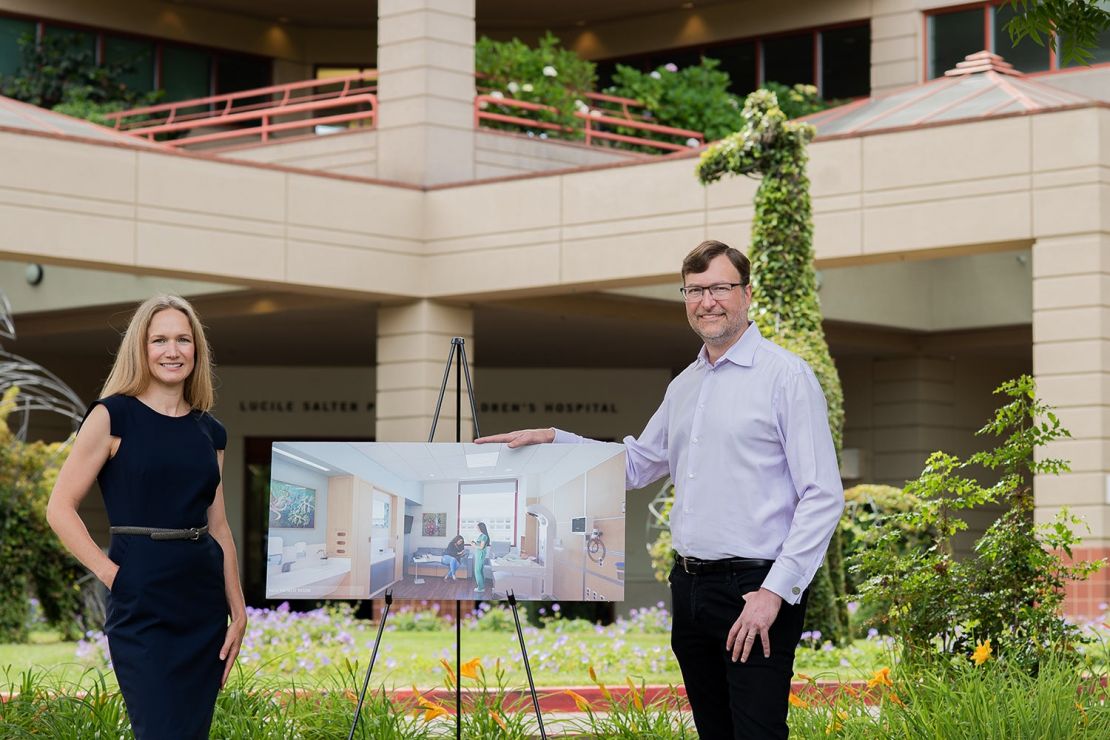A $100 million gift from the David and Lucile Packard Foundation will modernize the obstetric and neonatal facilities at Lucile Packard Children’s Hospital Stanford. This will enable the children’s hospital to deliver an unparalleled level of care and fund new facilities to increase access for expectant mothers and babies from throughout California and beyond.

Sierra Clark (left) – trustee of the David and Lucile Packard Foundation (DLPF) and granddaughter of Lucile Packard Children’s Hospital Stanford founder, Lucile Packard – outside the hospital’s West Building with a rendering of a future NICU patient room, and Dave Orr (right) – chair of the DLPF and grandson of Lucile Packard. (Image credit: Michelle Logan)
The gift will transform the hospital’s existing West building, which opened in 1991. It was (and continues to be) the only facility in the Bay Area to offer obstetric, neonatal, and developmental medicine services all in one place. The redesign will ensure a more comfortable patient experience and facilitate lifesaving care for complex pregnancies, deliveries, and newborn care. Nearly two-thirds of expectant mothers at Lucile Packard Children’s Hospital Stanford are high-risk, with patients coming from across the state, the nation, and the world for treatment.
“The Stanford community is privileged to have the David and Lucile Packard Foundation as a longstanding champion of Lucile Packard Children’s Hospital Stanford and the community we serve,” says Marc Tessier-Lavigne, president of Stanford University. “Their commitment to the health of mothers and children in the Bay Area – and around the globe – continues to have a transformational impact. We are immensely grateful.”
The new layout will increase the size of the labor and delivery unit to better serve the community, adding capacity for up to 20 percent more births. The building will also house the hospital’s first-ever dedicated and physically separate unit for high-risk moms who need to be hospitalized for days, weeks, or months before they deliver, ensuring rapid access to a state-of-the-art obstetric delivery suite.
“The David and Lucile Packard Foundation is delighted to help Lucile Packard Children’s Hospital Stanford continue to deliver on my grandmother Lucile’s vision. She believed that all mothers and children deserve the same excellent care,” says Sierra Clark, David and Lucile Packard Foundation trustee and Packard Children’s Hospital board member. “This reimagining of the obstetric and newborn care space will ensure mothers and babies have the best start possible at a beautiful and critical moment. As a family foundation with roots in Silicon Valley, we are especially proud to invest in this facility that will serve our diverse community for generations.”
The neonatal intensive care units (NICUs) will transition from having large, open rooms – which typically hold up to 10 babies, their parents and care teams, and medical equipment – to private rooms where parents can stay with their babies. Recent research shows that private NICU rooms reduce mortality, shorten hospital stays, lessen parental depression, and lower babies’ infection rates, as well as promote breastfeeding, family bonding, and parental involvement in care.
“It’s vital that more mothers and babies have access to Packard Children’s Hospital, in an enhanced environment that supports optimal physical and mental well-being,” says Yasser El-Sayed, MD, division chief of maternal-fetal medicine and obstetrics and the Charles B. and Ann L. Johnson Professor at the Stanford University School of Medicine; and the obstetrician-in-chief at Stanford Children’s Health. “This reimagined space will also facilitate impactful scientific research studies, which will accelerate our commitment to advance maternal and infant health in California and beyond.”
“I am incredibly proud of the world-class care we provide to our sickest babies,” says David Stevenson, MD, neonatologist at Stanford Children’s Health; senior associate dean for maternal and child health; and Harold K. Faber Professor of Pediatrics – neonatal and developmental medicine, at the Stanford University School of Medicine. “In designing the hospital, Lucile Salter Packard had the then-revolutionary idea of keeping newborns with other children – and mothers with their babies. That decision catapulted Stanford Children’s Health ahead of every other children’s hospital in the country, and this gift could do the same.”
This gift brings total giving by the David and Lucile Packard Foundation to the hospital to $614 million, making the Bay Area foundation the single largest philanthropic supporter of Lucile Packard Children’s Hospital Stanford and one of the biggest funders of children’s hospitals in the nation.
“We are honored to partner with the David and Lucile Packard Foundation to grow our ability to deliver the strongest possible start for expectant moms and their babies,” says Paul King, CEO and president of Stanford Children’s Health. “Every year, some 4,400 newborns are welcomed into the world at Lucile Packard Children’s Hospital Stanford. With this gift, the environment before, during, and after birth will match the already extraordinary level of care.”
The David and Lucile Packard Foundation and Stanford Children’s Health are committed to providing excellent and equitable health care for all, regardless of financial circumstances. To ensure that there are no gaps in care for moms and babies, the West building will remain open during construction. Renovations will be completed in phases, with the goal of concluding the $800 million project by the end of 2028. This lead gift for the fundraising initiative for obstetrics and neonatal facilities has meaningfully expedited the timeline for the building redesign.
“I hope that this extraordinary gift will inspire so many others in our community to invest in the health of moms and babies,” says Cynthia Brandt, PhD, president and CEO of the Lucile Packard Foundation for Children’s Health.